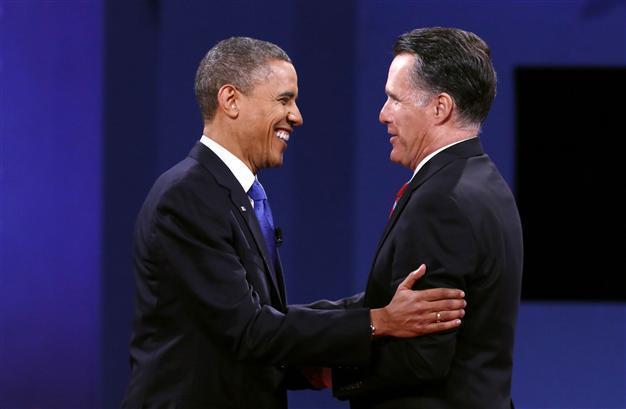
REUTERS Photo
U.S. President Barack Obama sharply challenged Republican rival Mitt Romney over foreign policy on Oct. 22, as the two presidential rivals squared off in their third and final debate with the race in a dead heat two weeks before elections.Ümit Enginsoy - ANKARA
The Armenian National Committee of America (ANCA), the largest and most influential U.S.-Armenian group, has announced that it will support neither President Barack Obama nor Republican candidate Mitt Romney in the Nov. 6 presidential election.
“Neither Barack Obama, who turned his back on the multiple promises he made on Armenian-American issues, nor Mitt Romney, who as a former governor of Massachusetts, has no evident public record on issues of special concern to our community, has earned the support of Armenian-American voters,” ANCA Chairman Ken Hachikian said in a press release last week.
“Our country’s federal policies on Armenian-American issues, sadly, remain hostage to the dictates of foreign officials, in Ankara and Baku. While we remain open to constructive engagement with both campaigns, we have no plans at this time to issue an ANCA endorsement this presidential election cycle,” he said.
“The president first signaled that he would break his pledge during a March 2009 speech in the Turkish Parliament during which he chose not to use the term Armenian genocide in calling upon Turkey to address its past, but did note that his ‘personal’ views in support of Armenian Genocide recognition remained unchanged,” the ANCA said.
“The Republican presidential candidate, Mitt Romney, former governor of Massachusetts... has no evident public record on Armenian issues from his four-year tenure as governor or his two campaigns for the White House. He has also not reached out, in any meaningful way, to meet or consult with the Armenian-American community’s leadership,” the ANCA said.
Soli Özel -ISTANBUL / Hürriyet Daily News
Washington’s main foreign policies are unlikely to change under a Republican presidency, but the United States’ language – including rhetoric toward Turkey – is likely to toughen if Mitt Romney unseats President Barack Obama, according to a Turkish scholar. A Romney administration would not intervene in Syria and would continue the U.S. pullout from Afghanistan, Soli Özel told the Hürriyet Daily News, but added that Washington’s foreign policy language would become more strident, especially toward Russia, Iran and Syria, and even toward Turkey, in the event of a Republican victory. Washington would also approach Turkey differently under Romney, he said, noting that Eric S. Edelman, a Romney campaign adviser and former
U.S. ambassador to Turkey, does not have good relations with
Prof. Dr. İlter Turan - ISTANBUL / Hürriyet Daily News
Neo-conservatives, who favor action and the use of force in foreign politics, will be more powerful in Washington if Republican challenger Mitt Romney is elected as U.S. president, an academician İlter Turan told the Hürriyet Daily News. This change of attitude will reflect on U.S.-Turkey relations, which will worsen as Washington would more forcefully ask Ankara to comply with its policies if
Romney came to power, according to Turan.
If Obama is reelected however, Turkey-U.S. relations will not change, even if the U.S. Secretary of State changes, he added. Turkey will also be under pressure to improve its relations with Israel if Romney came to power, as the Republican candidate has already expressed his unconditional support to Israel, Turan said.
WASHINGTON - Reuters
“Horses and bayonets” became the most memorable catch phrase of the debate. “You mentioned the Navy, for example, and that we have fewer ships than we did in 1916,” Obama said. “We also have fewer horses and bayonets, because the nature of our military’s changed. We have these things called aircraft carriers, where planes land on them. We have these ships that go under water, nuclear submarines,” he said.
Obama’s comments provided the latest debate-related phrase to become popular on social media. The hash tag “horsesandbayonets” trended on Twitter. A new tumblr website was created with entries such as a picture of Obama captioned, “We also have fewer bows and arrows and catapults” and images of Romney riding a horse and carrying a gun with a bayonet.
WASHINGTON
Neither man made a noticeable gaffe during the debate, but Romney did describe Syria as “Iran’s route to the sea.” Talking about the relationship between Iran and Syria, Romney said: “It’s unacceptable for Iran to have a nuclear weapon, and … Syria is their key ally. It’s their only ally in the Arab world. It is also their route to the sea.” For the most part, moderator Bob Schieffer stayed in the background of the third presidential debate, but he was caught making one notable verbal gaffe: confusing the names of the president and America’s former most wanted terrorist. Schieffer, the CBS News host, referred to “Obama’s bin Laden” when introducing a question about extremist groups supported by Pakistan, according to Fox.